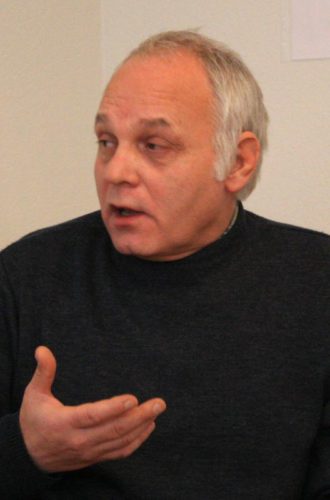


Director, principal director of Saratov Puppet Theatre Teremok (since 1999), honored artist of Russia, honored cultural worker of Russia.
He worked as an actor in Chelyabinsk Puppet Theatre, when Valery Volkhovsky was the head of the company; he was also actor and director of the theatre Svyataya Krepost’ [Sacred Fortress] in Vyborg. The production Bolero, which Shugurov directed together with Yuri Labetsky, was nominated for the National Theatre Award THE GOLDEN MASK. He taught puppet theatre acting in Saratov Conservatory, today his students are the young core of Saratov theatre company.
Teremok led by Shugurov is a puppet theatre with regularly renewed repertoire for adults, where one production logically continues the line of the previous one: New Pinocchio, The Glass Menagerie, A Midsummer Night’s Dream, The Stag King, Don Juan, Two Journeys of Lemuel Gulliver. In these productions, as well as in children’s productions, Shugurov’s director’s style is very distinctive, his auteur theatre is ensemble-structured, energetic, and philosophical; also, it is rhythmically subordinate to music, which Shugurov always selects on his own.
Name. Shugurov Gennady Igorevich
Date and place of birth. 29 May, the Soviet Socialist Republic of Estonia
Education. Higher
In a nutshell, please tell us about your career (who influenced you, where and how you started, who you worked with, which theatre you founded/became the head of, where you work now).
a) Nobody.
b) Theatre School in Gorky, LGITMiK. I had a good start.
Chelyabinsk Puppet Theatre.
Leningrad regional puppet theatre, Vyborg.
Puppet Theatre, Vladivostok.
Regional puppet theatre, Saratov.
Favorite authors, subjects, stories. Authors – those whose work resonates with me at the moment.
Favorite traditional system of puppets/ texture. The one I find necessary.
Does a performance need text? Everything is needed. Word, silence, plasticity, static, dynamics, light and darkness. (Winter coat and t-shirt, felt boots and flip flops).
Is the expression “puppet theatre” relevant today? Puppet theatre has never been relevant.
What, in your opinion, is the difference between puppet theatre in Russia and the West? (Advantages/disadvantages, problems of professional school). Organization and pathetic remains of professionalism.
What can be useful about collaboration and cultural exchange? From my experience, nothing. Different symptoms and diagnoses.